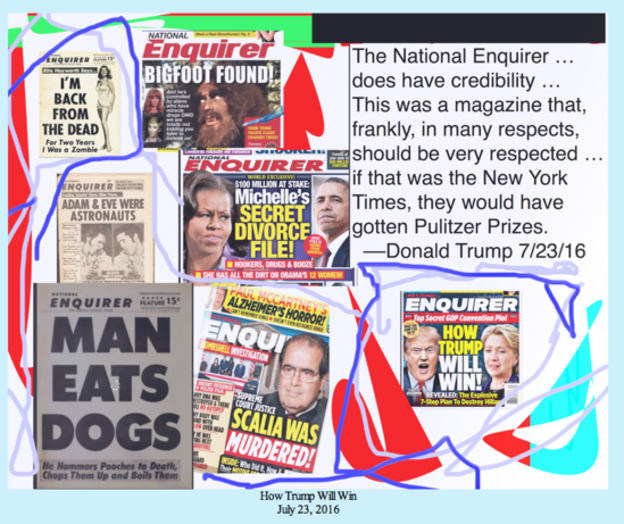
NPR News admits to role as Trump enabler: Defiantly refuses to make an intervention

In a conversation with reporter Mary Louise Kelly and NPR’s senior vice president for news, Michael Oreskes, NPR News makes clear that its policy is not to use the word “lies” when referring to blatant lying by Popular-Vote-Loser Trump and his aides. There has been much commentary on how the mediocracy contributed to the Trump election coup and this admission confirms that NPR is using a conscious strategy of doublespeak.
NPR News’s white-washing language abets and aids the Republican Insurgent Forces (RIF, also known as RIP), who, for their part, go on smearing anyone who opposes them as “crooked” and liars. This is a central tactic of Operation Birther, the disinformation campaign of the RIF, aimed at using the mediocracy to broadcast their lies. In the NPR broadcast, Kelly deceptively used the OED to say that to accuse a liar of lying you need to know that they are intending to deceive. In the end all of this is just NPR’s refusing to accept the obvious point that it mandates the use of euphemisms even in the face of clear and present dangers to our democracy. The bait and switch of “intent” for euphemism is not so much dishonest as misleading.
[Kelly] says she went to the Oxford English Dictionary seeking the definition of “lie.” “A false statement made with intent to deceive,” Kelly says. “Intent being the key word there. Without the ability to peer into Donald Trump’s head, I can’t tell you what his intent was. I can tell you what he said and how that squares, or doesn’t, with facts.”
This implies that NPR News believes that the president of the United States might be legally insane, someone who does not know the difference between truth and lying, a pathological liar; that he is delusional and may believe his own lies even though he has been repeatedly told that they are lies. This accusation is far more severe than calling the Groper-in-Chief out on his political modus operandi. If NPR News considers this plausible, they would need to say, “Trump might be lying or he might be delusional.” Where is the psychiatric justification that allows NPR to make delusion a credible explanation for Trump’s mendacity? Indeed, the quoted definition for the OED — noun1/1a — points out the point that the falsehood and untruth is a euphemism for lie, not a different meaning. The quotes for this first definition of lie stop in the nineteenth century. But even these belie NPR’s claim:
1791 J. Boswell Life Johnson anno 1781 II. 354 Johnson had accustomed himself to use the word lie, to express a mistake or an errour in relation … though the relater did not mean to deceive.
1834 F. Marryat Peter Simple II. xv. 264 All lies disgrace a gentleman, white or black.
1879 J. A. Froude Cæsar xx. 339 It was perhaps a lie invented by political malignity.
Nor does NPR News consider OED definition noun/1b: “Something grossly deceptive; an imposture.” The OED traces this “transferred sense” of the word back hundreds of years. If one considers OED verb2/1a, NPR’s prevaricating is brought sharp against itself: “To utter falsehood; to speak falsely.” Boswell, again, is exemplary of the double sense: “He lies, and he knows he lies.” (What can also say, he lies, but he does not know he lies.)
As if possessed of the ghost of logical positivist A.J. Ayer, NPR News believes that the price of objectivity is the aversion of truthfulness. Truth lies waiting, just over the bend; a lie’s a thing that never ends.
A short play for NPR News
Child steps on chair to reach cookie jar. Takes cookies out of jar and sits at kitchen table. Parental Unit walks in, stage left.
PU: I told you not to take the cookies.
C: I did not take any cookies.
PU: What is in your hands?
C: There is nothing in my hands.
PU: Don’t lie to me. I can see the cookies in your hand.
C: You are the liar … these are not cookies, they are berries.
PU: You are lying and you know it.
NPR report: PU incorrectly identifies the child’s statement as a lie since PU cannot truly know what is in the child’s mind. We recommend telling the child that PU has cause to question the child’s statement, which appears to be inaccurate.
Source:
“NPR and the Word Liar: Intent Is Key”